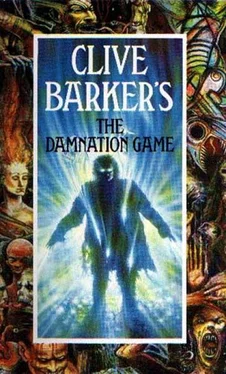Clive Barker - The Damnation Game
Здесь есть возможность читать онлайн «Clive Barker - The Damnation Game» весь текст электронной книги совершенно бесплатно (целиком полную версию без сокращений). В некоторых случаях можно слушать аудио, скачать через торрент в формате fb2 и присутствует краткое содержание. Жанр: Ужасы и Мистика, на английском языке. Описание произведения, (предисловие) а так же отзывы посетителей доступны на портале библиотеки ЛибКат.
- Название:The Damnation Game
- Автор:
- Жанр:
- Год:неизвестен
- ISBN:нет данных
- Рейтинг книги:4 / 5. Голосов: 2
-
Избранное:Добавить в избранное
- Отзывы:
-
Ваша оценка:
- 80
- 1
- 2
- 3
- 4
- 5
The Damnation Game: краткое содержание, описание и аннотация
Предлагаем к чтению аннотацию, описание, краткое содержание или предисловие (зависит от того, что написал сам автор книги «The Damnation Game»). Если вы не нашли необходимую информацию о книге — напишите в комментариях, мы постараемся отыскать её.
The Damnation Game — читать онлайн бесплатно полную книгу (весь текст) целиком
Ниже представлен текст книги, разбитый по страницам. Система сохранения места последней прочитанной страницы, позволяет с удобством читать онлайн бесплатно книгу «The Damnation Game», без необходимости каждый раз заново искать на чём Вы остановились. Поставьте закладку, и сможете в любой момент перейти на страницу, на которой закончили чтение.
Интервал:
Закладка:
"What are you thinking about?" she asked, more gently than before.
He took hold of her hand.
"There might come a time... not so far away... when I'd ask you to leave with me," he said.
"Leave?"
"Just up and go."
"Where?"
"I haven't thought that through yet. We'd just go." He halted, and looked at her fingers, which were now dovetailed with his. "Would you come with me?" he asked at last.
"Of course."
"Ask no questions?"
"What is this, Billy?"
"I said: ask no questions.
"Just go?"
"Just go."
She looked long and hard at him: he was washed out, poor love. Too much of that wretched old fart in Oxford. How she hated Whitehead, though she'd never met him.
"Yes, of course I'd go," she replied.
He nodded. She thought he might cry.
"When?" she said.
"I don't know." He tried to smile, but it looked misbegotten. "Perhaps it won't even be necessary. But I think it's all going to come down, and when it does I don't want us to be there."
"You make it sound like the end of the world."
He didn't reply. She didn't feel able to chisel at him for answers: he was too delicate.
"Just one question?" she ventured. "It's important to me." one.
"Did you do something, Billy? I mean, something illegal? Is that what it is?
His Adam's apple bobbed as he swallowed his grief. There was so much more she had to teach him yet; about allowing those feelings out. He wanted to: she could see so much bubbling away behind his eyes. But there, for now, it would stay. She knew better than to press him. He'd only withdraw. And he needed her undemanding presence more than she needed answers.
"It's all right," she said, "there's no need to tell me if you don't want to.
His hand was gripping hers so tightly she thought they'd never unknot them.
"Oh, Billy. Nothing's that terrible," she murmured.
Again, he made no reply.
The old haunts were much the same as Marty had remembered them, but he felt like a ghost there. Along the rubbish-strewn back alleys where he'd fought and run as a boy there were new combatants, and, he suspected, far more serious games. They were glue sniffers, these grubby ten-year-olds, according to the pages of the Sunday tabloids. They would grow up, disenfranchised, into needle freaks and pill pushers; they cared for nothing and nobody, least of all themselves.
He'd been an adolescent criminal, of course. Theft was a rite of passage here. But it had usually been that lazy, almost passive form of thieving: sidling up to something and walking, or driving, away with it. If the theft looked too problematic, forget it. Plenty of other shiny things to be fingered. It wasn't crime in the way he'd come to understand the word later. It was the magpie instinct at work, taking whatever opportunity offered, never intending much harm by it, or working up a sweat if things didn't quite fall your way.
But these kids-there was a group of them lounging on the corner of Knox Street-they looked like a more lethal breed altogether. Though they'd grown up in the same lusterless environment, he and they, with its few wretched attempts at tree planting, its barbed wire and glass-topped walls, its relentless concrete-though they shared all that, he knew they'd have nothing to say to one another. Their desperation and their lassitude intimidated him: he felt nothing was beyond them. Not a place to grow up in, this street, or any of them, along the row. In a way he was glad his mother had died before the worst of the changes disfigured the neighborhood.
He got to Number Twenty-six. It had been repainted. On one of her visits Charmaine had told him Terry, one of her brothers-in-law, had done it for her a couple of years back, but Marty had forgotten, and the change of color, after so many years of imagining it green and white, was a slap in the face. It was a bad job, purely cosmetic, and the paint on the windowsills was lifting and peeling already. Through the window the lace curtains that he'd always loathed so much had been replaced with a blind, which was down. On the window ledge inside a collection of porcelain figures, wedding presents, gathered dust, trapped in the forsaken space between blind and glass.
He still had his keys, but he couldn't bring himself to use them. Besides, she'd probably changed the lock. Instead, he pressed the bell. It didn't ring in the house, and he knew it was audible from the street, so it clearly no longer worked. He rapped his knuckles on the door.
For half a minute there was no sound from inside. Then, eventually, he heard dragging footsteps (she'd be wearing open-backed sandals, he guessed, and they made her walk ragged), and Charmaine opened the door. Her face was not made-up, and its nakedness made even plainer response to his standing there. She was unpleasantly surprised.
"Marty," was all she managed to say. No welcoming smile, no tears.
"I came on the off-chance," he said, attempting nonchalance. But it was obvious that he'd made a tactical error from the moment she sighted him.
"I thought you weren't allowed out-"she said, then corrected herself, "-I mean, you know, I thought you weren't allowed off the estate."
"I asked for special dispensation," he said. "Can I come in, or do we talk on the doorstep?"
"Oh... oh, yes. Of course."
He stepped inside, and she closed the door behind him. There was an uncomfortable moment in the narrow hallway. Their proximity seemed to demand an embrace, yet he felt unable, and she unwilling, to make the gesture. She compromised with a patently artificial smile, followed by a light kiss on the cheek.
"I'm sorry," she said, apologizing for nothing in particular. She led him down the hallway to the kitchen. "I just didn't expect you, that's all. Come on in. The place is in chaos, I'm afraid."
The house smelled stale; as though it needed a good airing. Washing, drying on the radiators, made the atmosphere muggy, like the sauna back at the Sanctuary.
"Take a seat," she said, lifting a bag of unsorted groceries off one of the kitchen chairs, "I'll just finish here." There was a second load of dirty washing on the kitchen table-hygienic as ever-which she began to load into the washing machine, her chatter nervous, her eyes never meeting his as she concentrated on the matter in hand; the towels, the underwear, the blouses. He recognized none of the clothes, and found himself ferreting through the soiled items looking for something he had seen her in before. If not six years before, then in visits to the prison. But it was all new stuff.
"-I just didn't expect you-" she was saying, closing the machine and loading powder into it. "I was sure you'd call first. And look at me; I look like a wet rag. God, it would be today, I've got so much to do-" She finished with the machine, pushed the sleeves of her sweater back up, said: "Coffee?" and turned to the kettle to make some without waiting for an answer. "You look well, Marty, you really do."
How did she know? She'd scarcely taken two glances at him in her whirlwind of activity. Whereas he, he couldn't take his eyes off her. He sat watching her at the sink, wringing out a cloth to swab down the counter, and nothing had changed in six years-not really-just a few lines on their faces. He had a feeling in him that was like panic; something to be held down for fear it make a fool of him.
She made him coffee; talked about the way the neighborhood had changed; about Terry and the saga of choosing the paint for the front of the house; about how much it cost on the subway from Mile End to Wandsworth; about how well he looked-"You really do, Marty, I'm not just saying that"-she talked about everything but something. It wasn't Charmaine talking, and that hurt. Hurt her too, he knew. She was marking time with him, that was all it was, filling the minutes with vacuous chat until he gave up in despair and left.
Читать дальшеИнтервал:
Закладка:
Похожие книги на «The Damnation Game»
Представляем Вашему вниманию похожие книги на «The Damnation Game» списком для выбора. Мы отобрали схожую по названию и смыслу литературу в надежде предоставить читателям больше вариантов отыскать новые, интересные, ещё непрочитанные произведения.
Обсуждение, отзывы о книге «The Damnation Game» и просто собственные мнения читателей. Оставьте ваши комментарии, напишите, что Вы думаете о произведении, его смысле или главных героях. Укажите что конкретно понравилось, а что нет, и почему Вы так считаете.








